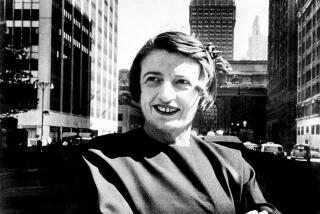Institute Offers Students Anti-Service Internships
- Share via
Whatever the benefits students receive by performing community service, schools have no business making it mandatory, say members of one California group.
The Ayn Rand Institute, a self-styled watchdog of individual liberties headquartered in Marina del Rey, is offering anti-service internships--ones that will allow students to fulfill a school service requirement while undermining the notion at the same time, the group says.
Using the one-year anniversary of President Clinton’s Philadelphia summit on volunteerism as a call to arms, the institute has launched a “Campaign Against Servitude.”
Starting this fall, students will be able to do their service work with the institute. The work will consist of research and other activities aimed at defeating mandatory volunteer work.
“Volunteerism is designed to turn Americans into guilt-ridden indentured servants--a program and morality more appropriate to a dictatorship than to a nation founded on independence and freedom,” the group wrote in an announcement detailing its “Freedom of Choice” internships.
The institute--devoted to the teachings of writer and philosopher Ayn Rand, a Russian immigrant who came to this country in the 1920s--maintains that selfishness is not negative, but rather the most rational way to live.
Followers of Rand are hyper-individualists; they do not believe in God, public schools or a governmental system that does anything more than ensure people leave one another alone.
Rutgers University professor Benjamin Barber, the founder of that school’s education-based community service program and an advisor to Clinton on citizenship and community service, dismisses the Rand Institute’s position as a semantic smoke screen.
Barber sees service programs as part of general education in civics. Requiring students to perform community service is no different than requiring math homework, he says.
“The strategy the opposition uses is to try to isolate and separate community service from the question of curriculum,” Barber said. “But if you put it back into the pedagogical basket where it belongs, then it’s another curricular decision . . . which schools have the right to make.”
Barber hearkens to the history of the public school movement, which began as an attempt to prepare young people for their role as active participants in a democracy.
But to the folks at Rand--who see public schooling as tantamount to government indoctrination of the nation’s young--citizenship training is just an extension of a bad idea.
“What mandated service is teaching is that it’s selfish or evil to pursue your own goals,” said Richard E. Ralston, the Rand Institute’s director of development.
*
And some service programs, such as those serving environmental causes, create “wide potential for ideological abuse in what is considered by the school bureaucracy and the teachers’ unions [to be] politically correct charity and what isn’t,” Ralston said.
The debate about social service requirements goes beyond the Rand Institute and service advocates.
John Seery, a professor of political theory at Pomona College in Claremont, said he appreciates the idea of students working in their communities, but has a hard time with the methods some schools are using.
“It’s ill-liberal liberalism,” Seery said. “It’s attempting to teach initiative and teach those kinds of commitment to the community, teach volunteerism and all those good things but to do so by a method that is at odds with the goal. As soon as you make it a requirement, you take the spirit out of the whole situation.”
More to Read
Sign up for Essential California
The most important California stories and recommendations in your inbox every morning.
You may occasionally receive promotional content from the Los Angeles Times.













